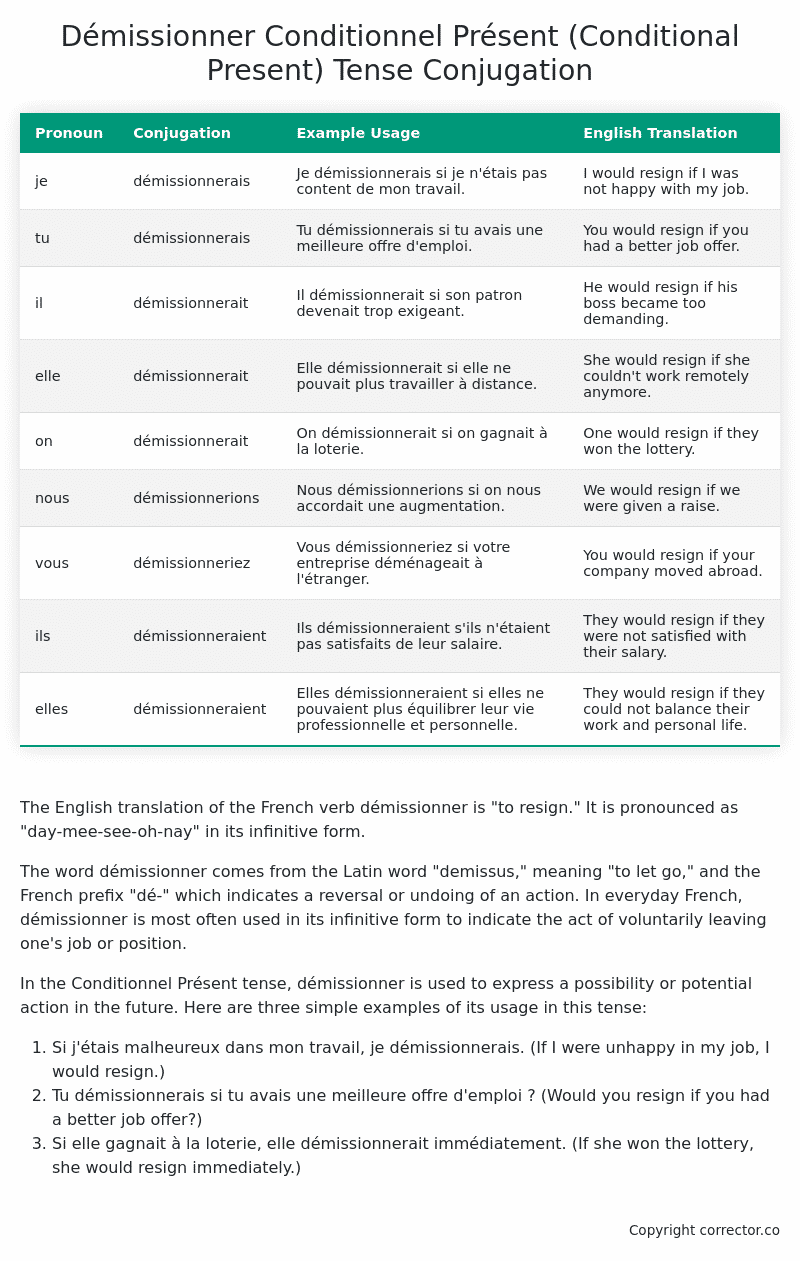Conditionnel Présent (Conditional Present) Tense Conjugation of the French Verb démissionner
Introduction to the verb démissionner
The English translation of the French verb démissionner is “to resign.” It is pronounced as “day-mee-see-oh-nay” in its infinitive form.
The word démissionner comes from the Latin word “demissus,” meaning “to let go,” and the French prefix “dé-” which indicates a reversal or undoing of an action. In everyday French, démissionner is most often used in its infinitive form to indicate the act of voluntarily leaving one’s job or position.
In the Conditionnel Présent tense, démissionner is used to express a possibility or potential action in the future. Here are three simple examples of its usage in this tense:
- Si j’étais malheureux dans mon travail, je démissionnerais. (If I were unhappy in my job, I would resign.)
- Tu démissionnerais si tu avais une meilleure offre d’emploi ? (Would you resign if you had a better job offer?)
- Si elle gagnait à la loterie, elle démissionnerait immédiatement. (If she won the lottery, she would resign immediately.)
Table of the Conditionnel Présent (Conditional Present) Tense Conjugation of démissionner
| Pronoun | Conjugation | Example Usage | English Translation |
|---|---|---|---|
| je | démissionnerais | Je démissionnerais si je n’étais pas content de mon travail. | I would resign if I was not happy with my job. |
| tu | démissionnerais | Tu démissionnerais si tu avais une meilleure offre d’emploi. | You would resign if you had a better job offer. |
| il | démissionnerait | Il démissionnerait si son patron devenait trop exigeant. | He would resign if his boss became too demanding. |
| elle | démissionnerait | Elle démissionnerait si elle ne pouvait plus travailler à distance. | She would resign if she couldn’t work remotely anymore. |
| on | démissionnerait | On démissionnerait si on gagnait à la loterie. | One would resign if they won the lottery. |
| nous | démissionnerions | Nous démissionnerions si on nous accordait une augmentation. | We would resign if we were given a raise. |
| vous | démissionneriez | Vous démissionneriez si votre entreprise déménageait à l’étranger. | You would resign if your company moved abroad. |
| ils | démissionneraient | Ils démissionneraient s’ils n’étaient pas satisfaits de leur salaire. | They would resign if they were not satisfied with their salary. |
| elles | démissionneraient | Elles démissionneraient si elles ne pouvaient plus équilibrer leur vie professionnelle et personnelle. | They would resign if they could not balance their work and personal life. |
Other Conjugations for Démissionner.
Le Present (Present Tense) Conjugation of the French Verb démissionner
Imparfait (Imperfect) Tense Conjugation of the French Verb démissionner
Passé Simple (Simple Past) Tense Conjugation of the French Verb démissionner
Passé Composé (Present Perfect) Tense Conjugation of the French Verb démissionner
Futur Simple (Simple Future) Tense Conjugation of the French Verb démissionner
Futur Proche (Near Future) Tense Conjugation of the French Verb démissionner
Plus-que-parfait (Pluperfect) Tense Conjugation of the French Verb démissionner
Passé Antérieur (Past Anterior) Tense Conjugation of the French Verb démissionner
Futur Antérieur (Future Anterior) Tense Conjugation of the French Verb démissionner
Subjonctif Présent (Subjunctive Present) Tense Conjugation of the French Verb démissionner
Subjonctif Passé (Subjunctive Past) Tense Conjugation of the French Verb démissionner
Subjonctif Imparfait (Subjunctive Imperfect) Tense Conjugation of the French Verb démissionner
Conditionnel Présent (Conditional Present) Tense Conjugation of the French Verb démissionner (this article)
Conditionnel Passé (Conditional Past) Tense Conjugation of the French Verb démissionner
L’impératif Présent (Imperative Present) Tense Conjugation of the French Verb démissionner
L’infinitif Présent (Infinitive Present) Tense Conjugation of the French Verb démissionner
Struggling with French verbs or the language in general? Why not use our free French Grammar Checker – no registration required!
Get a FREE Download Study Sheet of this Conjugation 🔥
Simply right click the image below, click “save image” and get your free reference for the démissionner Conditionnel Présent tense conjugation!

Démissionner – About the French Conditionnel Présent (Conditional Present) Tense
Formation
Common Everyday Usage Patterns
Expressing Polite Requests
Expressing Hypothetical Situations
Expressing Doubt or Uncertainty
Interactions with Other Tenses
Present Tense
Past Tense
Future Tense
Conditional Perfect
Summary
Want More?
I hope you enjoyed this article on the verb démissionner. Still in a learning mood? Check out another TOTALLY random French verb conjugation!


